Privacy-friendly operating systems are OSes designed with user privacy and data protection as primary objectives. These systems limit the amount of data collection, prevent third-party tracking, and often include built-in tools to maximize user anonymity and minimize the digital footprint. Some privacy-focused OSes also have a strong emphasis on open source development, ensuring that their code is publicly available for review and verification.
In an age where every click, keystroke, and online interaction can be monitored, recorded, and potentially exploited, the significance of digital privacy has never been more pronounced. As tech enthusiasts, everyday users, and digital rights advocates become increasingly aware of the risks associated with unchecked data collection and surveillance, there’s a palpable shift towards tools and platforms designed to prioritize user privacy.
At the forefront of this movement are privacy-friendly operating systems, tailor-made to offer both security and anonymity in our interconnected world. These systems embody a philosophy that challenges the status quo of the digital landscape, placing the user at the center of their own data narrative. Before delving into the specifics of these operating systems, it’s crucial to understand the ethos that drives their development and the urgent need they address in our increasingly digitized lives.
Fedora Workstation
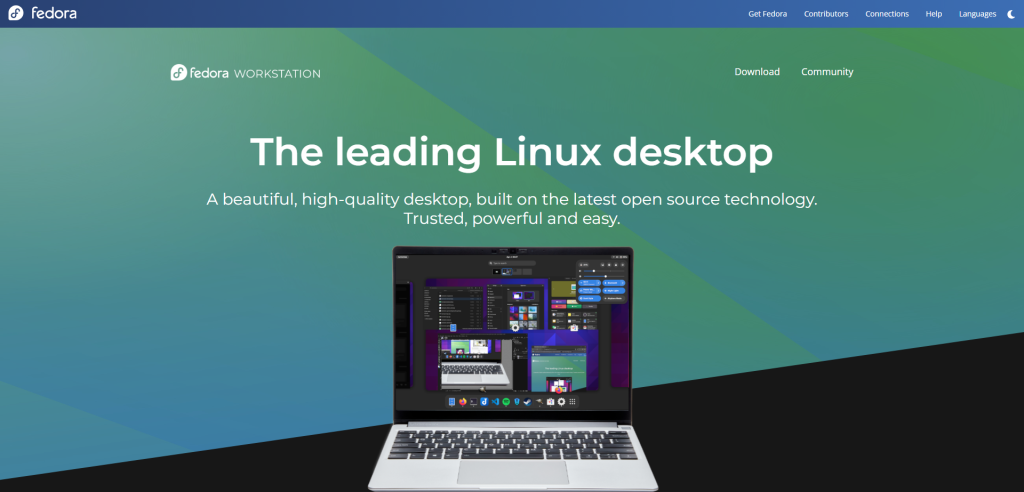
Fedora Workstation stands out as a leading Linux desktop platform. The operating system’s foundation on open source technology ensures it stays at the forefront of the tech evolution, providing users with the latest enhancements the open-source community offers.
With each version receiving updates for approximately 13 months, users can expect a dependable experience without the anxiety of having to frequently switch or upgrade. Transitioning between different versions of Fedora is touted to be quick and straightforward, a boon for both newbies and seasoned users.
Privacy-Centric
In a world teeming with advertisements and data breaches, Fedora’s commitment to privacy is refreshing. The tagline “your desktop is your own” aptly describes the experience. Not only is Fedora free, but it also refrains from showing ads, ensuring that your data stays with you.
For those who appreciate aesthetics, Fedora Workstation promises a beautiful and high-quality desktop experience. The interface is clean, devoid of clutter, offering both a dark mode for those late-night sessions and a night light feature to minimize screen glare, making it gentle on the eyes.
From fantastic applications to utilities like Clocks, Weather, and Maps, Fedora ensures that everyone, from casual users to developers, has tools tailored for their needs. The added bonus? Workstation speaks your language, thanks to a robust community of translators, making it accessible to users worldwide.
Developer-Friendly
Developers in particular have a lot to love here. Whether it’s making virtualization a breeze with Boxes, boosting hardware speed with performance mode, or accessing the latest container tools from the Red Hat ecosystem without any additional setup, Fedora Workstation seems to truly understand a developer’s requirements.
Beyond its features, what makes Fedora Workstation truly unique is its community-driven ethos. Everyone is invited to participate, contribute, and even chat with the team. For those keen on ensuring the platform remains top-notch, there are opportunities to participate in test days, thus aiding in refining the user experience.
For those seeking a Linux desktop that’s beautiful, user-friendly, developer-oriented, and privacy-focused, Fedora Workstation is a compelling choice. It’s evident that the platform is not just a product but a culmination of contributions from passionate individuals around the globe. Backed by Red Hat, its credibility is unquestionable. All in all, if you’re in the market for a new OS, Fedora Workstation definitely warrants consideration.
Whonix
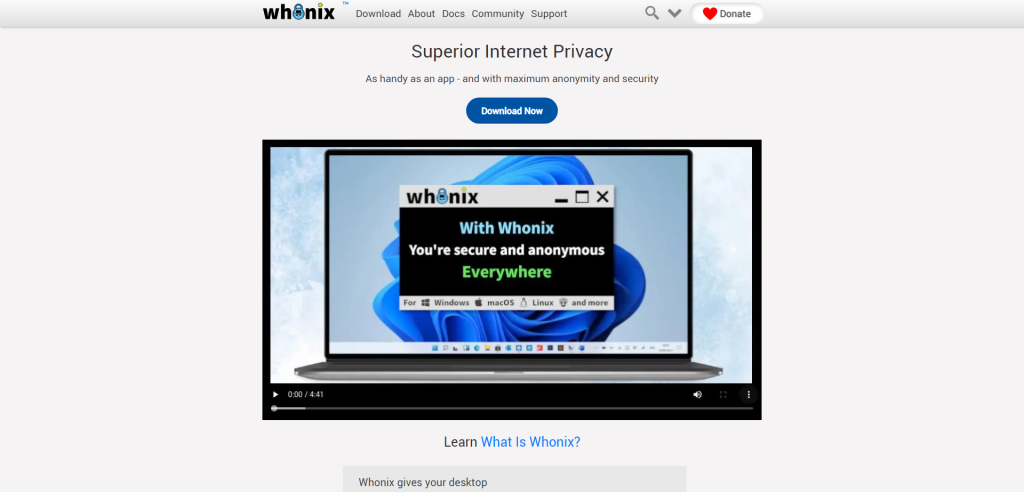
Whonix is making a splash in the world of privacy-focused operating systems. Touting itself as the “most watertight privacy operating system in the world,” it promises users a secure and anonymous online experience.
Key Features of Whonix
- Maximum Privacy and Anonymity: Whonix guarantees top-tier privacy by directing all your internet traffic through the Tor network, shielding your IP address.
- Ease of Use: Designed to run like an app within your primary OS, Whonix offers a seamless integration for Windows, Linux, MacOS, Qubes, KVM, and USB setups. An ISO version is also in the pipeline.
- Comprehensive Security: Beyond just hiding your IP, Whonix offers a broad spectrum of anti-tracking protection. Their security-hardened operating system, Kicksecure, is at the core of Whonix.
- Built-in Applications: Whonix comes with a range of pre-configured applications like the Tor Browser, Thunderbird (for encrypted email), KeePassXC (password manager), VLC, Electrum (Bitcoin wallet), and Monero.
- Protection against Identity Leakage: An interesting feature of Whonix is its ability to cloak your typing style. Recognizing that each individual’s typing behavior can serve as a unique identifier, Whonix offers a protective layer to mask your keystrokes.
- Pricing: Whonix is available for free, although donations are welcome to support the project.
Whonix outperforms traditional VPNs in several areas. Both hide basic IP addresses, but Whonix takes it a step further by ensuring hidden identities and no logging “by design.” Whonix also boasts a higher average of server relays and offers superior virus/malware protection.
Whonix champions user freedom and transparency. It’s open-source, enabling users and developers worldwide to review and modify the software, enhancing security for everyone. This proactive stance towards user privacy ensures no collection of sensitive personal data.
Notable figures and organizations in the cybersecurity space endorse Whonix. Edward Snowden, for instance, mentions using “Qubes and a Whonix gateway” daily. Publications like Wired, The Guardian, and TechRepublic have also spotlighted Whonix for its advanced privacy features.
For anyone prioritizing online privacy and security, Whonix is an excellent choice. It’s more than just a privacy-focused operating system; it’s a commitment to user freedom, transparency, and state-of-the-art security measures. Whether you’re a casual internet user or a cybersecurity enthusiast, Whonix is designed to keep you safe and anonymous in the ever-evolving digital landscape.
Ubuntu
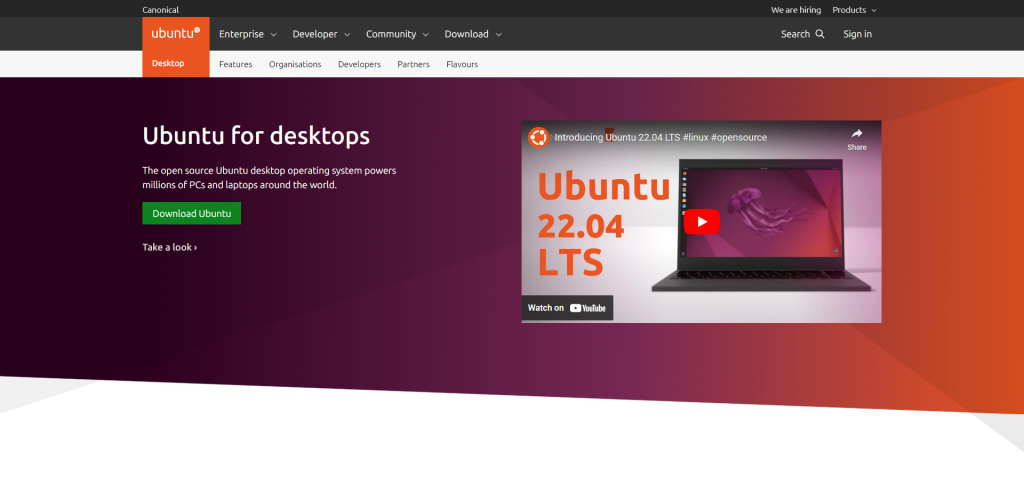
When we talk about privacy-friendly operating systems, the conversation often circles back to Ubuntu. But what makes it stand out?
The first thing that strikes you about Ubuntu is its simplicity and user-friendliness. For newcomers to the world of open-source, it offers an intuitive interface that feels both modern and familiar. The claim that Ubuntu is “fast and secure” isn’t just marketing jargon – the OS is known for its stability and low vulnerability to threats.
One of Ubuntu’s strengths is its rich repository of apps. From everyday essentials to specialized tools, Ubuntu boasts a wide range of software, most of which are free. Apps like Spotify, VLC Player, and Firefox are household names, assuring users of quality and reliability. Developers and coders will appreciate tools like Atom and PyCharm, while the presence of messaging apps like Telegram ensures that communication isn’t left behind.
For professionals and students alike, Ubuntu’s compatibility with LibreOffice is a boon. It allows for the creation and editing of documents, spreadsheets, and presentations. The compatibility with Microsoft Office means no more format issues when sharing or receiving files.
Browsing and Email
Ubuntu’s support for Firefox, known for its speed and lesser resource consumption compared to other browsers, makes web browsing seamless. Although it comes pre-installed with Thunderbird for email, it’s adaptable to any other popular email services like Gmail or Microsoft Exchange.
Photography enthusiasts and professionals can rely on apps like Shotwell and Gimp to manage, edit, and share photos. Ubuntu also simplifies video watching with HD playback right from the browser. For video editing, tools like Shotcut and kdenlive are at the user’s disposal.
Ubuntu isn’t just for work; it’s for play too. The OS supports a myriad of games from basic puzzles like Sudoku to high-end games available on platforms like Steam. Games like Dota 2 and Counter-Strike: Global Offensive underscore its versatility in this domain.
Open Source
Privacy enthusiasts often lean towards open-source solutions, and Ubuntu embodies this spirit. Its code is open, ensuring transparency. This means that anyone can inspect, modify, and enhance the software, which in turn contributes to its security and adaptability.
Behind Ubuntu is Canonical, a global software vendor renowned for its consistent support to the Ubuntu project. Their active involvement means regular updates, patches, and fixes, ensuring that the OS remains updated and secure.
Ubuntu offers a comprehensive package for both newcomers and experienced users looking for a privacy-friendly OS. With its vast app ecosystem, commitment to open-source, and robust support system in the form of Canonical, Ubuntu stands as a top choice for those prioritizing privacy, functionality, and ease of use in their computing experience. If you’re considering switching or installing a new OS, Ubuntu is worth a closer look.
Tails
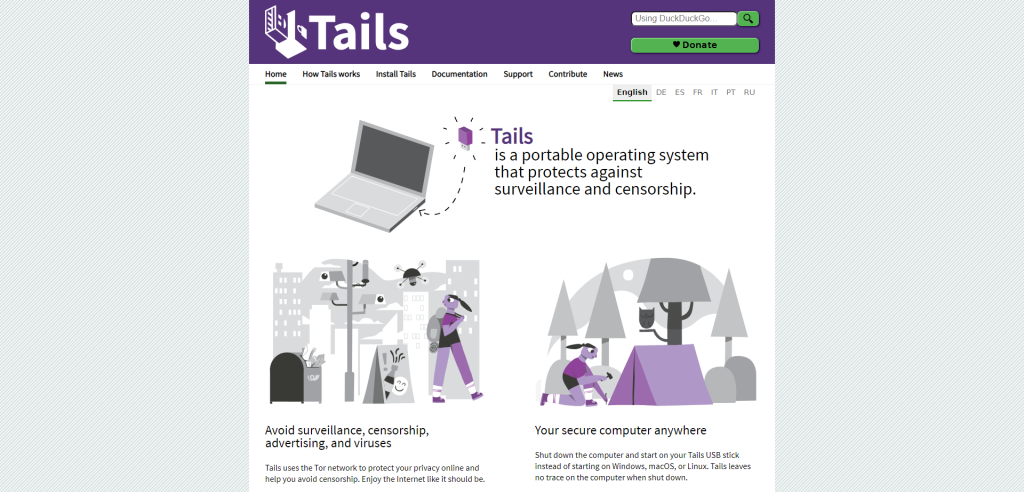
Amid a slew of operating systems, one shines bright when it comes to user privacy – Tails. This comprehensive review will help you understand what Tails offers and if it’s the right choice for your privacy needs.
Tails is a portable operating system dedicated to protecting users against surveillance and censorship. The primary objective is to offer a safe, anonymous browsing experience, free from unwanted snooping.
Key Features of Tails
- Tor Network Integration: Tails utilizes the Tor network, ensuring encrypted and anonymous browsing. This means your online activities remain confidential, protecting you from surveillance, advertising, and even potential cyber threats.
- No Trace Left Behind: A unique aspect of Tails is its amnesic nature. When you shut down the system, no trace is left on the computer. It’s as if you were never there.
- Digital Security Tools: Tails comes packed with applications specifically chosen for their security features. This includes Tor Browser, Thunderbird for encrypted emails, KeePassXC for password management, LibreOffice, OnionShare, and a Metadata Cleaner.
- Persistent Storage: While Tails forgets your activities upon shutdown, it offers encrypted Persistent Storage on the USB stick for important files, configurations, emails, and additional software.
- Software Transparency: The codebase of Tails is public. This transparency allows independent security research, ensuring Tails operates as promised. The OS is based on Debian GNU/Linux, a well-regarded foundation in the tech community.
Who Benefits from Tails?
- Activists seeking to hide their identities and communicate securely.
- Journalists and their sources looking to publish sensitive information without fear of retribution.
- Domestic violence survivors aiming to evade surveillance at home.
- General users in need of extra digital privacy.
Trusted by Experts
Notably, Edward Snowden, an NSA whistleblower, recommends Tails. Snowden emphasizes the importance of reducing potential mistakes, and he believes Tails, in conjunction with Tor, achieves this. Additionally, institutions like the Electronic Frontier Foundation and the Tor Project endorse Tails for its robust privacy offerings.
User Experience
Tails is user-friendly and doesn’t require extensive technical knowledge. By running it from a USB stick, you can temporarily transform any computer (be it Windows, macOS, or Linux) into a secure workstation. And with a relatively small download size of 1.3 GB and a quick 30-minute installation process, it’s accessible even for those on the go.
However, while Tails is designed for security, it isn’t foolproof. Users should be cautious about installing it from compromised devices or using it on machines with potential hardware threats like keyloggers.
Whether you’re an activist, journalist, or an everyday user, if privacy matters to you, Tails is worth considering. As always, remember that no system is impenetrable, but with Tails, you’re taking a significant step towards a more private digital experience.
Qubes OS
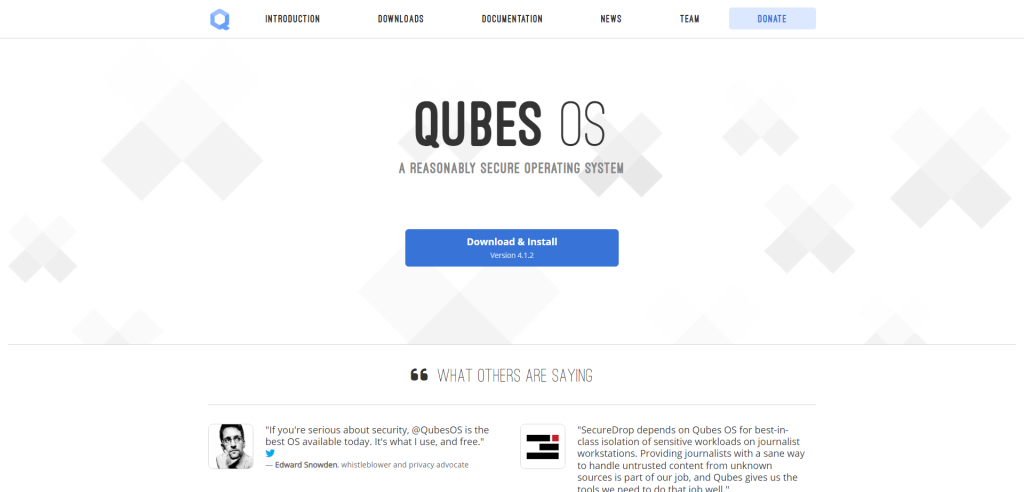
When it comes to security and privacy, there are few operating systems that stand out as much as Qubes OS. With a plethora of features dedicated to ensuring a safe computing environment, it’s gaining attention amongst tech enthusiasts and professionals alike.
The Concept Behind Qubes OS
Unlike traditional operating systems that run all software in a single environment, Qubes OS approaches security from a compartmentalization perspective. Think of it as having multiple, isolated rooms in a building, where each room serves a specific purpose, ensuring that one room’s mishap doesn’t affect the others.
These “rooms” in Qubes OS are referred to as “qubes”. They’re essentially isolated compartments where you can run specific software or tasks. Each qube is a virtual machine (VM) with specific purposes, natures, and trust levels. This ensures that even if malware affects one qube, it doesn’t spread to others.
Highlighted Features
- Strong Isolation: Qubes OS provides an environment where software pieces are isolated as if they were on separate computers.
- Multiple Operating Systems: Whether you’re a fan of Fedora, Debian, or even Windows, Qubes OS supports them all.
- Disposable Qubes: Need a temporary space? Create disposables that vanish once you shut them down.
- Whonix Integration: For Tor users, Qubes offers secure system-wide Tor usage.
- Device Isolation: Qubes ensures secure handling of devices by isolating USB controllers and network cards.
- Split GPG & U2F Proxy: Enhance security for private keys and two-factor authentication devices.
- Open Source Nature: Being open-source, Qubes OS promotes community involvement and transparency, essential for trust.
Why Opt for Qubes OS?
Digital life is not compartmentalized. That’s a problem Qubes OS aims to solve. Imagine all your online activities – shopping, banking, social networking – all happening in the same room. A security breach in one activity can compromise everything. Qubes OS changes that by allowing users to separate their digital activities into distinct compartments, minimizing risks.
Furthermore, Qubes OS recognizes that no software is flawless. Instead of claiming absolute security, the OS works on the principle of containing any potential security threat.
For those actively targeted, like journalists and whistleblowers, or even for everyday users who prioritize privacy, Qubes OS offers a haven. It’s a realm where one can surf, click on links, and install software without constant worry.
The credibility of Qubes OS is further enhanced by endorsements from security experts and organizations, including Edward Snowden and the Freedom of the Press Foundation. When renowned figures in the security realm are users and advocates, it speaks volumes about the trustworthiness of the OS.
Final Thoughts
In a digital age where security threats are rampant and evolving, Qubes OS offers a fresh approach. By focusing on compartmentalization, the OS ensures that a breach in one area doesn’t jeopardize everything. While prior experience with Linux can be beneficial, the emphasis on privacy and security makes Qubes OS a compelling choice for many.
If you’re a privacy advocate, researcher, journalist, or just someone who values their digital privacy, Qubes OS deserves serious consideration.
Disclaimer: Always ensure that any software or OS meets your specific needs before full adoption.
Summary
In an era where digital safety is paramount, the importance of choosing the right protective measures cannot be overstated. As we navigate our online worlds, having a system in place that prioritizes our security is not just a luxury but a necessity.
Whether you’re a professional in a sensitive field or an individual keen on maintaining your digital privacy, understanding and employing the best practices is crucial. It’s about creating a digital space where we can work, play, and connect without the lurking fear of vulnerability. Remember, in the vast realm of cyberspace, your defense strategy is your strongest asset. Make it count.
